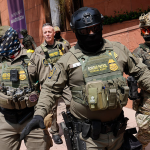Iran raised a symbolic red flag of revenge above an important mosque while vowing to take revenge against Israel over its assassination of Hamas Chief Ismail Haniyeh.
The red flag with the inscription, “O ye avengers of Hussein,” was raised above Jamkaran Mosque in the city of Qom. The flag is rarely raised outside the mourning of the Muharram month, which commemorates the death of the Shiite Imam Hussein ibn Ali. According to the Kashmir Observer, it has only been raised above the mosque outside of religious reasons six times in recent history, notably after the assassination of Islamic Revolutionary Guards Corps Leader Qasem Soleimani in January 2020.
Meanwhile, the Iranian government vowed revenge against Israel.
“The criminal, terrorist Zionist regime martyred our dear guest in our territory and has caused our grief, but it has also prepared the ground for a severe punishment,” Supreme Leader Ali Khamenei said in a post on X.
“Following this bitter, tragic event which has taken place within the borders of the Islamic Republic, it is our duty to take revenge,” he added.
The Iranian mission to the United Nations hinted at the form of revenge against Israel, saying, “The response to an assassination will indeed be special operations—harder and intended to instill deep regret in the perpetrator.”
Iran has several means of retaliation at its disposal. The response is likely to be significant due to the assassination taking place in the heart of its capital.
In April, Iran launched the first direct missile attack against Israel in its history following the assassination of an IRGC commander and several officers in an Israeli airstrike against the Iranian Consulate in Damascus, Syria. Wednesday’s assassination could see a similar response.
Iran could also act through its numerous allied militia groups, including the Houthis in Yemen, Hezbollah in Lebanon, and Shiite militias in Iraq and Syria. A senior military leader of Hezbollah was assassinated in Beirut on Tuesday, meaning a response was likely already being planned.
Haniyeh, 62, head of Hamas’s Political Bureau, resided in Qatar throughout the Israel-Hamas war and was visiting Tehran for the inauguration of Iranian President Masoud Pezeshkian. He was killed in a presumed Israeli airstrike early Wednesday. His death was announced by the Iranian Islamic Revolutionary Guard Corps and confirmed by Hamas Wednesday morning, local time.
CLICK HERE TO READ MORE FROM THE WASHINGTON EXAMINER
Qatar and Egypt, who have been playing a key role in negotiations between Israel and Hamas, both condemned the assassination as tarnishing the chances of a hostage and peace deal.
“Political assassinations and continued targeting of civilians in Gaza while talks continue leads us to ask, how can mediation succeed when one party assassinates the negotiator on the other side?”, Qatari Prime Minister Sheikh Mohammed bin Abdulrahman Al Thani said in a post on X.









 For those who are now discussing the raising of the red flag of revenge in Iran and saying that there will definitely be a big war now.
For those who are now discussing the raising of the red flag of revenge in Iran and saying that there will definitely be a big war now. The red flag of revenge was raised after the assassination of Qassem Suleimani in 2020. This resulted in a coordinated strike on the…
The red flag of revenge was raised after the assassination of Qassem Suleimani in 2020. This resulted in a coordinated strike on the… 















